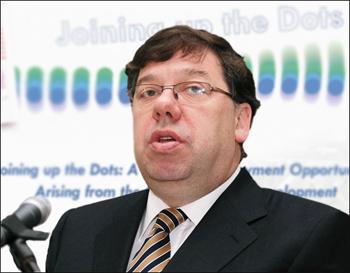Cowen apportions blame to anyone but himself

Brian Cowen's recent 'mea culpa' was really just an exercise in finger-pointing. By Vincent Browne.
Several years ago, I was asked to speak at a lunch function in Limerick. I asked the chairman how long I should speak. He said: ‘‘You can talk for as long as you like, but we’re going to the bar in ten minutes.”
I hope that is what the chairman of the North Dublin Chamber of Commerce said to Brian Cowen last Thursday evening before he started his 7,427-word, extremely qualified half-apologia.
This was as dull as it gets, and I hope the audience went to the bar well before the ten minutes were up.
The title of the speech was the best bit: ‘‘The Irish banking crisis: the mistakes, the responses and the lessons’’
At last, it seemed, we were going to get some acknowledgement, by the person singly most responsible for the chaos we are in, of how he royally cocked it all up. Oddly enough, no. The speech was more about how right he had been all along. The mistakes, according to Cowen, were:
1. Fundamental errors were made in the management of individual banks which led to excessive risk-taking (all their fault).
2. Banks became too dependent on wholesale funding. As a result, when the international credit market unexpectedly froze, the banks were vulnerable and in need of government guarantees (all their fault).
3. Inadequate financial regulatory controls were implemented in Ireland and other international economies based on a mistaken view of governance in banks (all the Financial Regulator’s fault).
4. With the benefit of hindsight, property tax incentives from the mid-1990s should have been abolished years before Cowen’s decision to abolish the incentives in December 2005 (all Charlie McCreevy’s fault).
5. Individuals were left in dominant positions in individual financial institutions for too long. There were stunning failures of corporate governance and not enough turnaround in management personnel in those institutions (all the fault of the banks’ directors).
6.There was a failure to impose international stability risk assessment and protection systems which took account of the interaction of global financial systems. This was not a peculiarly Irish problem, as recent events in Europe have demonstrated (all the regulators’ fault).
7. There was a failure to implement more intensive compliance regulation of those financial institutions which were too big to fail. Auditors, regulators and governments all share part of this responsibility (all the regulators’ fault again).
8. The higher capital requirements on speculative property loans in Irish banks, introduced at the start of 2007, should have been imposed many years earlier, before the rapid escalation in property lending (all the regulator’s fault).
There is an obvious question to ask Brian Cowen, and it is this: when you were told in early 2007 that Anglo Irish Bank was a basket case, why did you do nothing? (He was Minister for Finance in 2007.)
The answer might be that, sure, he was told something alright, but did nothing about it.
Or maybe he was told nothing at all. Who knows?
Instead, the answer would be what the IMF said about the Irish banks, how the OECD said that everything was wonderful, how even the ESRI was telling us the best is yet to come, and how Fine Gael wanted to let rip even more.
Later on in the answer, there would have been some fudge about Anglo in early 2007, and eventually a straight assertion that he was told no such thing about Anglo in early 2007. This would be after several follow-up questions, and long after TV viewers or radio listeners had gone to the bar.
Even if the only person in the world listening to the interview by then was the interviewer (presuming the interviewer wasn’t thinking of going to the bar as well), you’d hope the point would have been made: ‘‘But in early 2007, the National Treasury Management Agency (NTMA) was refusing to deposit any of the monies which it had borrowed on the bond markets, with Anglo Irish Bank, and Anglo was very upset about that. Did nobody tell you?”
There’d be lots of stuff about how NTMA is an autonomous agency and it was up to them to decide where to deposit money.
Yes, but Anglo Irish Bank was kicking up quite a bit about NTMA’s attitude to the bank, and isn’t it implausible that nobody asked you: ‘‘What is the NTMA up to?”
New question: ‘‘The head of the NTMA, Michael Somers, was directly responsible to you as Minister for Finance. Did he never mention to you directly, or to any of your officials, that he was so scared about the solvency of Anglo from early 2007 that he didn’t want to deposit any money with them?
Answer: ‘‘Communications between public officials and the Minister are a matter of confidentiality, and the whole system would break down if every bit of tittle-tattle were to be disclosed to the world at large. It would lead to a breakdown of confidence and would destroy the great work people in the public service do, day in, day out.”
Capitulation: ‘‘That’s it. I can’t take anymore. I’m joining the others in the bar . . .”
